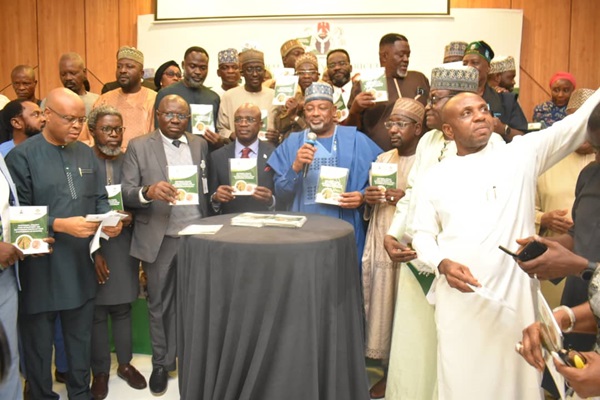
The Federal Government has officially launched the National Soybean Production Policy and Strategy as part of its renewed efforts to achieve food sovereignty, diversify the economy and unlock the opportunities embedded in the soybean value chain.
Speaking at the unveiling ceremony held in Abuja, the Minister of Agriculture and Food Security, Sen. Abubakar Kyari, said the new policy and strategy provide a clear roadmap for increasing soybean production, enhancing value addition and expanding both domestic and international markets. He revealed that the government’s target is to cultivate one million hectares of farmland and deliver 460,000 metric tons of soybean grain to the market within the next two years.
According to him, the policy is in line with President Bola Tinubu’s ‘Renewed Hope’ agenda, which places agriculture at the core of national economic transformation. He emphasised that the goal of food security is not just a policy aspiration but a national mission meant to rebuild rural economies, generate employment and establish Nigeria as an agricultural powerhouse.
“To achieve this vision,” the minister stated, “we must face the realities of our current production levels. Nigeria currently produces about 1.35 million metric tonnes of soybean annually, yet national demand exceeds 2.7 million metric tonnes, driven by the growing food, feed and industrial sectors.”
“This supply gap presents both a challenge and a great opportunity to boost production, strengthen processing capacity and create thousands of jobs,” he added.
Sen. Kyari further described soybeans as not only an economic and industrial crop but also a vital source of nutrition. Containing about 40 per cent high-quality protein and essential amino acids, soybeans is important in the fight against malnutrition and efforts to improve household diets.
The minister noted that Nigeria’s soybeans are naturally non-GMO, which gives the country a competitive edge globally. He said this uniqueness places Nigeria in a strong position to become a leading supplier of raw soybean grain as well as value-added products such as soybean oil, flour, tofu, and protein isolates.
He added that soybeans also play a key role in the local agricultural economy, especially in the animal feed industry. Approximately one-third of Nigeria’s soybean production is used in poultry feed, where it forms about 20 to 25 per cent of the feed mix.
Kyari called for strong collaboration and leadership among stakeholders, stressing the need for collective action. “The time has come to take the next decisive step in the Nigerian Soybean Partnership, which we are launching today,” he said. “This partnership is designed to bring together federal and state governments, private sector actors, farmer cooperatives and development partners to build an integrated and competitive value chain.”
In his remarks, the governor of Benue State, Rev. Father Hyacinth Alia described the National Soybean Expansion Strategy as a forward-thinking and bold initiative that is expected to generate N3.9 trillion in annual revenue, create one million jobs across 22 states and the FCT, and position Nigeria as a major player in global agriculture.
Governor Alia emphasised Benue State’s central role in this vision. “Since the introduction of the ‘Malayan’ soybean variety in 1937, our fertile Guinea Savanna has sustained generations of farmers. Our fields, blessed by nature and upheld by tradition, have made Benue the leading producer of soybeans in Nigeria and Sub-Saharan Africa,” he said.
Also speaking at the event, the permanent secretary of the Federal Ministry of Agriculture and Food Security, Dr. Marcus Ogunbiyi explained that the launch aimed at scaling up soybean production and repositioning the crop as a strategic commodity for national food security, industrial growth and foreign exchange earnings.
He acknowledged the commitment of development partners in the soybean value chain and expressed confidence in their continued collaboration, noting that their presence at the event underscored the national importance of the new policy and strategy.
A statement by the ministry’s director of information signed by Anthonia Eremah highlighted the signing of a memorandum of understanding (MoU) between the Dantata Group and the Benue State government as one of the major outcomes of the event.
Other dignitaries in attendance included commissioners of agriculture from various states, senior ministry officials, and representatives of development organisations such as the Commodity Development Initiative (CDi), Nigeria Soybean Partnership, Expera Global Cooperation and the National Agricultural Development Fund.


